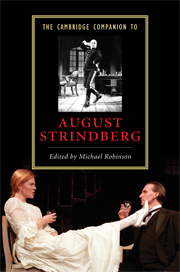Book contents
- Frontmatter
- Part I: Strindberg in context
- Part II: The works
- 3 Learning to speak: Strindberg and the novel
- 4 Between realism and modernism: the modernity of Strindberg’s autobiographical writings
- 5 Miss Julie: naturalism, ‘The Battle of the Brains’ and sexual desire
- 6 Strindberg and comedy
- 7 Crisis and change: Strindberg the unconscious modernist
- 8 A modernist dramaturgy
- 9 The Chamber Plays
- 10 The history plays
- Part III: Performance and legacy
- Bibliography
- Index
5 - Miss Julie: naturalism, ‘The Battle of the Brains’ and sexual desire
from Part II: - The works
Published online by Cambridge University Press: 28 May 2010
- Frontmatter
- Part I: Strindberg in context
- Part II: The works
- 3 Learning to speak: Strindberg and the novel
- 4 Between realism and modernism: the modernity of Strindberg’s autobiographical writings
- 5 Miss Julie: naturalism, ‘The Battle of the Brains’ and sexual desire
- 6 Strindberg and comedy
- 7 Crisis and change: Strindberg the unconscious modernist
- 8 A modernist dramaturgy
- 9 The Chamber Plays
- 10 The history plays
- Part III: Performance and legacy
- Bibliography
- Index
Summary
My hair ought really have turned white after these most recent experiences, but it hasn't done so yet. To be continually tormented by uncertainty has made me insensible to the reality of life, however horrible it is! An interest in the psychological aspects also sustains me - most remarkable of all, the hypnotic state in which sexual desire places a man, so that he neither hears nor sees - and woman's vast talent for simulation, an incredible talent. An unaroused male would spot her gigantic effrontery, stupid plotting, and foolish attempts at concealing things right away!
(SL, p. 244)Though authors often use their lives as a source for their fiction, few writers have blended fact, research and fiction as effectively as August Strindberg. Miss Julie typifies Strindberg's creative energy and the close relation between what he wrote and what he lived. The play has been one of his most widely read and performed works, translated into numerous languages and performed on stage, radio, television and film. Touching on some of the most complex and controversial topics in Western literature, the play's influence can be seen in the works of authors ranging from Ibsen to Chekhov, O'Neill and Genet.
Public responses to Miss Julie have always been complicated; its shocking subject matter and dialogue made it difficult to stage in its own time, though these elements surprise the modern reader less. Yet the play confronts issues that are as current now as they were when the play was written: class conflict, gender stereotypes and a degree of sexuality that ranges from the seductive to the sadomasochistic.
- Type
- Chapter
- Information
- The Cambridge Companion to August Strindberg , pp. 58 - 69Publisher: Cambridge University PressPrint publication year: 2009

